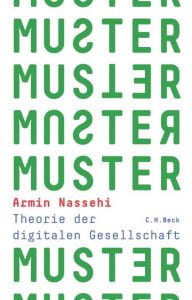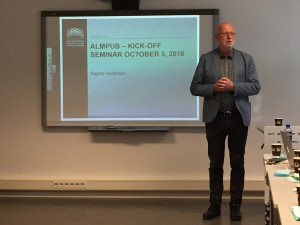Finally my presentation at the CoLIS conference in Ljubljana is online. We are working on the text for the proceedings and a similar publication just went into the publication system for the German Library Congress Proceedings (see previous post here).
I was presenting the paper just the day before Habermas‘ 90th birthday and we could show the cover page of DIE ZEIT from this week with one of his rare photos celebrating him as the „most famous philosopher of our time“. Indeed the discussion in our ALMPUB sessions showed that it is perhaps time to look after his disciples (Axel Honneth) and critics (Lyotard, Rancière) to address the current situation in our digital societies (as did some commentaries on this special edition on Habermas in DIE ZEIT).
Our project nevertheless started in the vein of the traditional „public sphere“ concept of Jürgen Habermas and reveiled through 18 surveys in over 6 european countries that there is a sort of a paradigm change experienced in the „ALM-field“. In an Age of Access (Rifkin 2000) we are constantly going to from „neutral“ collecting and information broking to being an active political stance in society. As I always said at least libraries have a role to play in the hegemonial power structure of every society (Gramsci). Or as the swedish National Library Strategy says: they are the „femte statsmakten“ – the fifth power in a state (beyond the legislature, the executive, the judiciary, and the media in the „trias politica model“ after Montesquieu.).
For further information about the results of our project have a look at the forthcoming book at de Gruyters and the closing conference at the new Deichman library in Oslo in January 2020. Some other publications might be of interest:
- Audunson, Ragnar; Aabø, Svanhild; Blomgren, Roger; Evjen, Sunniva; Jochumsen, Henrik; Larsen, Håkon et al. (2019): Public libraries as an infrastructure for a sustainable public sphere. A comprehensive review of research. In: Journal of Documentation 75 (4), S. 773–790. DOI: 10.1108/JD-10-2018-0157.
- Audunson, Ragnar; Aabø, Svanhild; Blomgren, Roger; Hobohm, Hans-Christoph; Jochumsen, Henrik; Khosrowjerdi, Mahmood et al. (2019): Public libraries as public sphere institutions. A comparative study of perceptions of the public library’s role in six European countries. In: Journal of Documentation 75 (in print).
- Audunson, Ragnar; Hobohm, Hans-Christoph; Tóth, Máté (2019): ALM in the public sphere. How do archivists, librarians and museum professionals conceive the respective roles of their institutions in the public sphere? Beitrag zur 10th Conference on Conceptions of Library and Information Science, Ljubljana, 2019. In: Information Research (Suppl. CoLIS10), in print.
- Hobohm, Hans-Christoph (2019): Bibliotheken und Demokratie in Deutschland. Ergebnisse eines europäischen Projektes zu ihrer Rolle und ihrem Engagement für Demokratie und Gemeinwohl. In: o-bib. Das offene Bibliotheksjournal 6 (4), (zugleich: Proceedings des 7. deutschen Bibliothekskongresses „Bibliotheken verändern“, Leipzig, 18.-21. März 2019). in print.
 Nassehi, Armin: Muster. Theorie der digitalen Gesellschaft. München: C.H.Beck, 2019. 352 S. – Hardcover, EUR 26,-, ISBN 978 3 406 74024 4
Nassehi, Armin: Muster. Theorie der digitalen Gesellschaft. München: C.H.Beck, 2019. 352 S. – Hardcover, EUR 26,-, ISBN 978 3 406 74024 4
